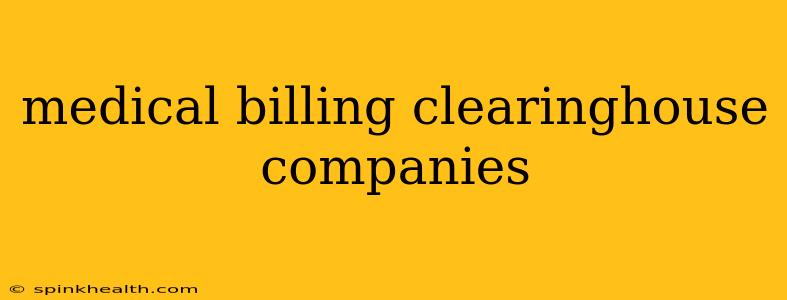The world of medical billing can feel like a labyrinth, filled with complex codes, regulations, and paperwork. For healthcare providers, the efficient and accurate submission of claims is crucial for financial stability. This is where medical billing clearinghouse companies step in, acting as the vital bridge between healthcare providers and payers. But with so many options available, choosing the right clearinghouse can feel overwhelming. This comprehensive guide will illuminate the path, answering your burning questions and helping you find the perfect partner for your practice.
Imagine this: you're a doctor, passionately dedicated to patient care. You've spent your day diagnosing, treating, and comforting your patients. The last thing on your mind should be the intricate details of medical billing. Yet, timely and accurate billing is the lifeblood of your practice. This is where the magic of a medical billing clearinghouse comes into play. These companies act as intermediaries, electronically transmitting claims to insurance payers, streamlining the entire process and saving you valuable time and resources.
What is a Medical Billing Clearinghouse?
A medical billing clearinghouse is a third-party company that acts as an intermediary between healthcare providers (like doctors' offices, hospitals, and clinics) and insurance payers (like Medicare, Medicaid, and private insurance companies). They receive claims from providers, translate them into a standardized electronic format, and then transmit them to the appropriate payers. Think of them as highly efficient postal services, but for medical claims. They handle the complex technical aspects of electronic data interchange (EDI) and ensure claims are formatted correctly to maximize reimbursement rates.
How Do Medical Billing Clearinghouse Companies Work?
The process is remarkably straightforward:
- Claim Submission: You submit your patient's claims data to the clearinghouse through a secure portal or software integration.
- Data Translation: The clearinghouse translates your data into a format understood by the payers' systems. This often involves complex coding and format conversions.
- Claim Transmission: The clearinghouse electronically sends your claims to the appropriate insurance companies.
- Payment Processing: Once the payer processes the claim, the clearinghouse receives the payment information and forwards it to your practice, often depositing it directly into your bank account.
- Reporting & Analytics: Most clearinghouses provide detailed reports and analytics on your claims, allowing you to monitor your billing performance and identify potential issues.
What are the Benefits of Using a Medical Billing Clearinghouse?
The advantages are numerous:
- Increased Efficiency: Automating the billing process dramatically reduces the administrative burden on your staff.
- Reduced Errors: Clearinghouses minimize errors in claim submissions, leading to faster payments.
- Faster Payments: Electronic claim submission significantly accelerates the payment cycle compared to manual processing.
- Improved Cash Flow: By receiving payments more quickly, your practice maintains better cash flow.
- Compliance: Clearinghouses ensure your claims adhere to all payer regulations, minimizing the risk of denials.
- Cost Savings: While there are fees associated with using a clearinghouse, the overall savings in time, resources, and reduced denials usually outweigh the costs.
What Features Should I Look for in a Medical Billing Clearinghouse?
Choosing the right clearinghouse is crucial. Consider these key features:
- Integration Capabilities: Seamless integration with your practice management software is essential.
- Claim Scrubbing: This automated feature checks for errors before submission, dramatically reducing denials.
- Customer Support: Reliable and responsive customer support is vital when encountering issues.
- Reporting & Analytics: Comprehensive reporting helps you track your billing performance and identify areas for improvement.
- Security: The clearinghouse must have robust security measures to protect patient data.
What are the Different Types of Medical Billing Clearinghouse Companies?
Clearinghouses cater to various practice sizes and specialties. Some specialize in specific areas, like dental billing or ophthalmology. Others offer a more generalized service. Researching and finding a clearinghouse that aligns with your practice's needs is paramount.
How Much Do Medical Billing Clearinghouse Services Cost?
The pricing models vary greatly depending on the services offered and the volume of claims processed. Some charge per claim, while others offer subscription-based plans. Get quotes from several companies to compare costs and services.
How Do I Choose the Right Medical Billing Clearinghouse for My Practice?
Choosing the right clearinghouse is a critical decision. It's a partnership, and finding one that aligns with your specific needs and values is essential. Thoroughly research different options, compare pricing and features, and consider seeking recommendations from other healthcare providers. Don't hesitate to ask questions and request demos before making a commitment.
The journey through medical billing doesn't have to be a daunting one. With the right medical billing clearinghouse partner, you can navigate the complexities with ease, allowing you to focus on what matters most: providing exceptional patient care.

